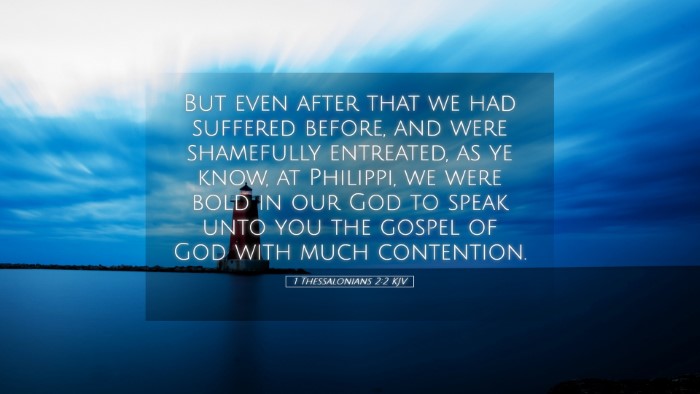Commentary on 1 Thessalonians 2:2
Verse: "But after we had suffered before, and were shamefully entreated, as ye know, at Philippi, we were bold in our God to speak unto you the gospel of God with much contention."
Introduction
This verse illustrates the apostle Paul’s boldness in proclaiming the gospel despite significant persecution. It serves as a template for understanding the challenges faced by early Christians and the resilience displayed in the face of adversity. Paul’s experience in Philippi is recounted to provide a backdrop that highlights the nature of his ministry among the Thessalonians.
Persecution and Suffering
Paul begins by referencing his prior suffering at Philippi. Public domain commentaries emphasize that Paul was brutalized and imprisoned there, as elaborated by Adam Clarke. This historical context enhances our understanding of what it meant for Paul to face suffering for the sake of the gospel. He does not shy away from the discomfort but openly acknowledges it, which serves as an encouragement for others facing similar trials.
- Matthew Henry notes the apostle's fortitude, seeing it as a testament to God’s sustaining grace. Despite facing shameful treatment, Paul was resolute in his mission.
- Albert Barnes reflects on the shameful treatment, citing that Paul’s experience was indicative of the trials that followers of Christ would often face when delivering God’s message.
Boldness in the Face of Contention
Paul’s response to suffering is one of boldness, a recurring theme found in his letters. He articulates that his courage stems from God. The phrase "we were bold in our God" illustrates the necessity of divine empowerment in evangelism. Both Matthew Henry and Albert Barnes emphasize that this boldness is not mere human bravado but is anchored in a profound relationship with God.
- Clarke points out that this boldness is a direct counter to the fear that might arise from past experiences, emphasizing trust in God as the foundation of singular focus on the gospel.
- Henry discusses the important role of the Holy Spirit in emboldening believers to speak truth even amidst adversarial conditions.
Proclaiming the Gospel
The latter part of the verse centers on the act of speaking the gospel. For Paul, proclaiming the gospel compels him, regardless of the circumstances. His commitment to evangelism serves as an exemplar for today’s Christian leaders and students of the Word. The phrase "the gospel of God" reflects the origin of the message, emphasizing its divine nature.
- Barnes articulates that the message Paul bore was transformative and empowered by God—a powerful reminder to all concerning the nature of the gospel they preach.
- Henry highlights that the delivery of the gospel is often met with contention, reinforcing the idea that true proclamation invites opposition.
The Role of Contentious Environment
Lastly, Paul’s acknowledgment of the "much contention" he faced is crucial for us to understand the spiritual battleground accompanying gospel proclamation. This highlights the reality that spiritual warfare is often the context for ministry. Paul does not shy away from this reality but rather embraces it as part of his calling. The insights shared by Clarke and Henry suggest that pastors must be prepared for conflict and opposition when advancing God’s kingdom.
- Clarke articulates that despite the contention, Paul maintained a focus on the truth and integrity of the gospel.
- Henry posits the idea that confrontation should not lead to despair but propel believers toward greater dependence on God.
Concluding Thoughts
In conclusion, 1 Thessalonians 2:2 is rich with themes of perseverance, divine empowerment, and the unyielding nature of the gospel message. For pastors, theologians, and students, Paul exemplifies the heart of a true evangelist—bold yet humble, aware of personal suffering yet relying on God’s strength. The insights of Henry, Barnes, and Clarke provide a robust framework in which to understand not only the text but also the challenges faced in ministry today. In a world where proclaiming the gospel may invite contention, we are called to remember Paul's example—to be bold in our God, fully committed to sharing the good news despite the trials we may face.


